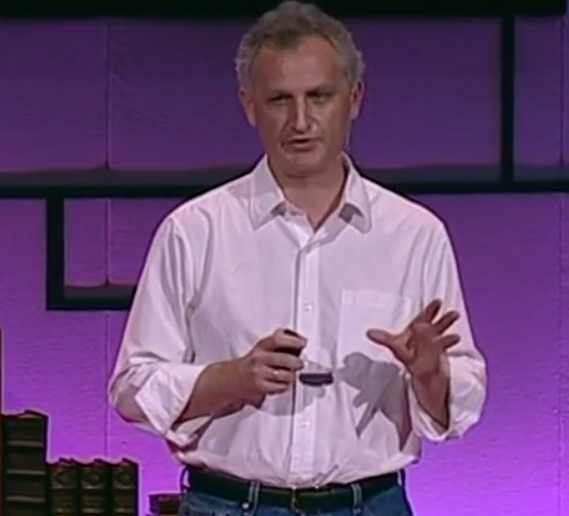(单词翻译:单击)
演讲文本
Ralph Waldo Emerson described language as "fossil poetry."
诗人艾默生曾将语言描述为“化石般的诗”。
But before it was fossil poetry, language was fossil metaphor.
但是在它成为化石般的诗之前,语言是化石般的暗喻。
And these fossils still breathe.
而这些化石现在仍具有生气。
Take the three most famous words in all of Western philosophy: "Cogito ergo sum."
就拿在西方哲学中最有名的三个词来说:Cogito ergo sum
That's routinely translated as, "I think, therefore I am." But there is a better translation.
通常被翻译为“我思故我在。”但是有一种更好的译法。
The Latin word "cogito" is derived from the prefix "co," meaning "together," and the verb "agitare," meaning "to shake."
这里拉丁文"cogito"是从前缀"co"而来,意思是"在一起",而动词"agitare"是“摇动”的意思

So, the original meaning of "cogito" is to shake together.
所以"cogito"的原意是一起摇动。
And the proper translation of "cogito ergo sum" is "I shake things up, therefore I am."
而"cogito ergo sum"的适切的翻译是"我摇动事物,故我在."
Metaphor shakes things up, giving us everything from Shakespeare to scientific discovery in the process.
暗喻摇动事物,它带给我们从莎士比亚到科学发现的各样事情。
The mind is a plastic snow dome, the most beautiful, most interesting,
我们的思想是一个圣诞节的雪花球,它最美丽、最有趣,
and most itself, when, as Elvis put it, it's all shook up.
也最本色的时候,就是它被使劲摇动的时候,像埃尔维斯所说的一样。
And metaphor keeps the mind shaking, rattling and rolling, long after Elvis has left the building. Thank you very much.
暗喻让我们的思想不住的摇动,叮当作响,滚动不已,尽管埃尔维斯早已离开。谢谢各位。
视频及简介
演讲简介:
格言爱好者及作家James Geary将对人类语言中的暗喻,这一引人入胜的现象进行阐述。Geary还说,从亚里士多德到猫王都是暗喻之友,暗喻也能微妙地影响到我们的决策。


